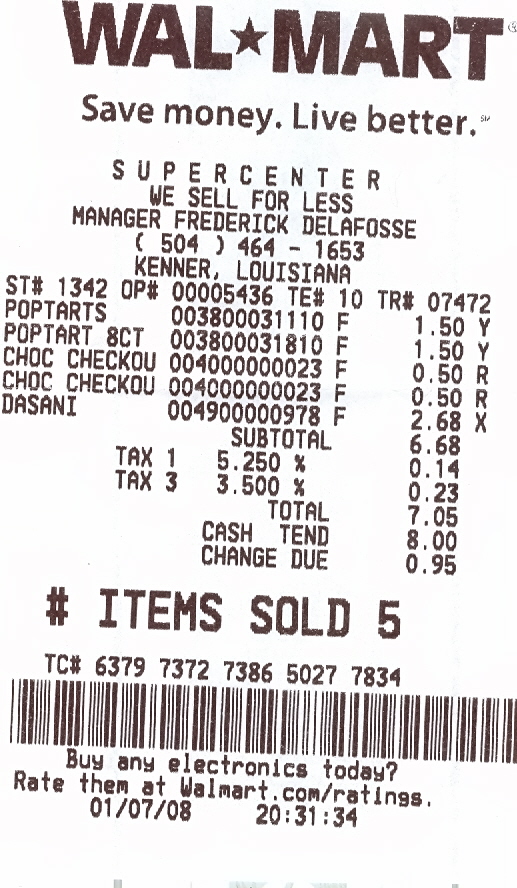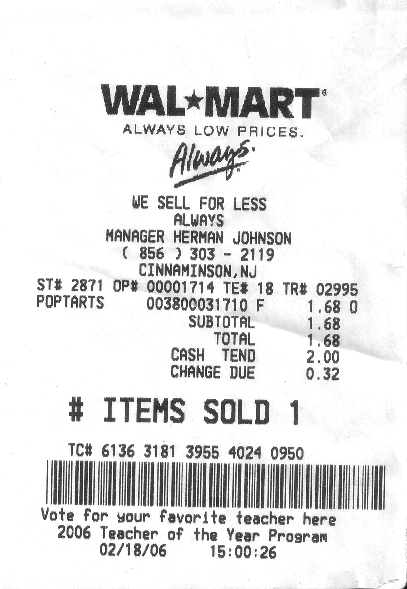
|

|
Click here |
MIS 204.101
Management Information Systems
Spring 2010
John Smiley
Last Updated: May 5, 2010
"Be greedy when others are fearful, but be very
fearful when others are greedy." -Warren Buffett-
"I never give anyone hell. I just tell the truth. They think
it is hell." -Harry Truman-
"There is only one boss: the customer, and he (or she) can fire everyone in the company from the chairman and down, simply by spending their money somewhere else."
-Sam Walton-
Interested in raising your midterm grade? Click here
Late Stuff:
|
Case Study |
Resume |
MISource |
|
Danielle Cullen |
Danielle
Cullen Stephen Haldis Catarina Moreira |
Gloria Ahn Danielle Cullen Dakota Hahn Stephen Haldis |
What I have

|

|
Click here |
|
Office: |
None |
| Phone: | (856)314-8615 (24 hours a day) |
| Email: | psu@johnsmiley.com |
| Website: | http://www.johnsmiley.com |
| Textbook: | Introduction to Information Systems: Essentials for the e-Business Enterprise with MIS Source 2007, 15TH Edition |
| ISBN: | 978-0-07-337677-6 |
| Author: | James A. O’Brien and George M. Marakas |
| Book Website: | http://highered.mcgraw-hill.com/sites/0073376779/student_view0/index.html http://www.mhhe.com/misource MISource Online Version of CD Rom |
Other Materials Required:
| CD ROM | MISource 2007 |
| Wall Street Journal: | http://wsjstudent.com/ When ordering, specify Semester Schools, Enter '190' for the Zip Code, find Penn State Abington, and please select my name from the Professor's drop down list box |
| Overview: |
MIS 204 is an introduction to the role of computer-based information systems in business organizations. The focus of this course will be the preparation of the student for future interaction with computer-based management information systems. Topics will include basic technical concepts fundamental to information system design and usage, management and control of information systems, transaction processing systems, and decision support systems. |
| Class times: | Monday Evenings, 6:00-8:40, Sutherland Room 208 Classroom until 7:30, Lab from 7:30 to 8:40. |
| Assignments | Readings/Class Participation: |
| Each chapter is divided into two sections and each section includes a real world case. All students are required to read one chapter each week. In addition, be prepared to discuss the first real world case in each chapter. It is strongly recommended that you answer, in writing, the case questions before class. End of chapter discussion questions, MiSource, and the on-line quizzes will help you prepare for the exams | |
| Wall Street Journal: (10% of your grade) | |
|
As a business student and
future business leader, you need to be
continuously informed about events that may impact
your work. Reading
the Wall Street Journal daily is essential!
In this course, you are required to read
the WSJ and be prepared to report on an article
each class. Record
the title, author, date, and section and page
number on a 3x5 index card and hand in at each
class. You
may choose an article of interest to your career
or to the material in Students will be called on randomly to report on their chosen articles. You will have several opportunities to report throughout the semester. Introduce your article by title, date and author. Include an explanation about the article’s relevance to this course or to your intended major or career. The article must be timely---something from the week leading up to class. It is advisable to prepare a written summary or outline of each article that can be referenced during your oral report. However, you are not permitted to read your summary to the class. If you are not prepared to report on a current article when you are called on, you will forfeit your opportunity to satisfy the Wall Street Journal Grade. |
|
| Case Study: | |
| Each student is assigned one Case Study from the Textbook to prepare and write up (See the schedule below). You need to summarize the Case Study and answer the 3 questions following the Case Study in the book. In the past, short summaries and short answers to the questions (less than 3 sentences) have resulted in poor grades. | |
|
MISource 2007 (10% of your grade) |
|
| The
MISource
2007 CD comes with our Textbook, and you may
install it on your computer (Click here for
screenshots of the installation).
Complete the MIS Concept, Computer Concept, Excel and Access modules according to the suggested schedule below. MISource allows you to print a report of your progress, which you should turn into me. You may turn in your report the night of the Final Exam---but it would be a good idea to submit your work periodically during the Semester. |
|
MISource 2007 Alternative.
If you prefer not
to complete the MIS Concept and Computer Concept
Access modules, you may submit all
of the following. (1) The Microsoft Word Resume
indicated above (2) An Excel spreadsheet to list the
courses you have taken here at |
|
Students with Disabilities: |
Penn State encourages academically qualified students with disabilities to take advantage of its educational programs. Students with disabilities who may need accommodations for this class should contact the disability liaison, Anne Prior, 315 Sutherland, Tel. 215-881-7537 |
| Learning Center: |
Free peer and professional tutoring and study skill coaching are available at the Learning Center (Room 315 Sutherland, 215-881-7538). Students striving for an “A” and students struggling for a “C” agree that they benefit from tutoring sessions. To find out how the Learning Center can help you, call or visit Mondays through Thursdays from 9:00 to 5:30 PM and Fridays from 9:00 to 4:00 PM |
| Integrity: |
According
to the University Advising Handbook:
"Academic integrity is the pursuit
of scholarly activity in an open, honest and
responsible manner. Academic integrity is a
basic guiding principle for all academic
activity at the Pennsylvania State University,
and all members of the University community are
expected to act in accordance with this
principle. Consistent with this expectation, the
University's Code of conduct states that all
students should act with personal integrity,
respect other student's dignity, rights and
property, and help create and maintain an
environment in which all can succeed through the
fruits of their efforts. Academic integrity
includes a commitment not to engage in or
tolerate acts of falsification,
misrepresentation or deception. Such acts of
dishonesty violate the fundamental ethical
principles of the University community and
compromise the worth of work completed by
others.” Bottom line: If you cheat, I will catch you, and you won't like the consequences. |
| Attendance: |
Superior performance requires superior attendance. There is
a direct correlation between poor performance on test and examinations and
irregular attendance at class. Past results
indicate that it's NEARLY impossible to get an A in this course without PERFECT
attendance.
There is NO need to notify me prior to missing a class. |
Grading:
| Component | Material | Held/Due Date | Percentage |
| Midterm Examination | Chapters 1-6 | March 15 | 30% |
| Final Examination | Chapters 7-12 | May 3 | 30% |
| Attendance/Class Participation | Various | Various | 10% |
| MISource Lessons | See below | Various | 10% |
| Case Study | 1 written Case Study | Various | 10% |
| Wall Street Journal Assignment | Index
Cards 1 Presentation |
Various | 10% |
| Letter Grade | Final Numeric Grade |
| A | 95.00-100 |
| A- | 90.00-94.99 |
| B+ | 87.70-89.99 |
| B | 83.30-87.69 |
| B- | 80.00-83.29 |
| C+ | 75.00-79.99 |
| C | 70.00-74.99 |
| D | 60.00-69.99 |
| F | 59.99 AND BELOW |
Notes:
Class Schedule
|
Date |
Topics |
|
January
11 |
Introductions |
|
January
18 Week #2 |
No Class---Martin Luther King Day. Volunteer your time off. |
| January
25 Week #3 |
Foundations of Information Systems in Business |
|
February
1 |
Competing with Information Technology Read:
Chapter 2 |
|
February
8 |
No
class--I'm out of town. Do Chapter 3 on your
own.
Computer Hardware
Read: Chapter 3 |
|
February
15 |
Computer Software Read:
Chapters 4 |
|
February
22 |
Data Resource Management Read: Chapter 5 Read: Chapter 5 Margin Notes Case Studies: Cogent Communications, Intel, and Others (Stephen Haldis---Late) Applebee's, Travelocity, and Others (Jacqueline Hall---Got it) Amazon, eBay, and Google (Lauren Hall---Got it) |
|
March
1 |
Telecommunications and Networks |
|
March
8 |
Spring Break |
|
March
15 |
Electronic Business
Systems Read: Chapter 7 Read: Chapter 7 Margin Notes Checkout: http://www.solectron.com/ Case Studies: NetSuite Inc., Berlin Packaging, Churchill Downs, and Others (Maryam John---Late) OHSU, Sony, Novartis, and Others (Ryan Johnson---Got it ) Perdue Farms and Others (Tuan Le---Got it) |
|
March
22 |
Midterm Examination (Chapters 1 through 6) |
|
March
29 |
Electronic Commerce Systems Read:
Chapter 8 |
|
April
5 |
Decision Support Systems Read:
Chapter 9 |
|
April 12 |
Developing Business/IT Solutions Read:
Chapter 10 |
|
April 19 |
Security and Ethical Challenges Read:
Chapter 11 |
|
April 26
Week #16 |
Enterprise and Global Management of Information Technology Read:
Chapter 12 |
|
May 3
Week #17 |
Final Examination (Chapters 7-12) |
| Lab |
Suggested |
Module | Lesson Topics | Lesson |
| 1 | Jan 25 | MIS
Concepts Computer Concepts Computer Concepts |
Introduction
to MIS Concepts The Systems Development Life Cycle Application Software Secondary Storage |
All
(7) All (6) All (7) All (3) |
| 2 | Feb 1 | Computer Concepts | The Internet and the World Wide Web | All (11) |
| 2 | Feb 1 | Computer Concepts |
Networks Developing Systems |
All (5) All (1) |
| 4 | Feb 15 | Excel | Introduction
to Excel Managing Workbooks |
All
(6) All (7) |
| 5 | Feb 22 | Excel | Working with Cells and Cell Data | All (16) |
| 6 | Mar 1 | Excel | Formatting Worksheets | All (10) |
| 7 | Mar 8 | Excel Excel Resume due: Mar 15 |
Printing
Worksheets Working with Charts and Graphics |
All
(6) All (6) Print and email file to: psu@johnsmiley.com |
| 8 | Mar 15 | Excel | Analyzing Data | All (13) |
| 9 | Mar 22 | Excel Access |
Workgroup
Collaboration Introduction to Access |
All
(5) All (12) |
| 10 | Mar 29 | Access | Creating and Modifying Tables | All (10) |
| 11 | Apr 5 | Access | Creating and Modifying Queries | All (13) |
| 12 | Apr 12 | Access | Creating
and Modifying Forms Viewing and Organizing Information |
All
(7) All (9) |
| 13 | Apr 19 | Access | Defining
Relationships Producing Reports |
All
(2) All (7) |
| 14 | Apr 26 | Access | Integrating
with Other Apps Managing Databases |
All
(5) All (4) |